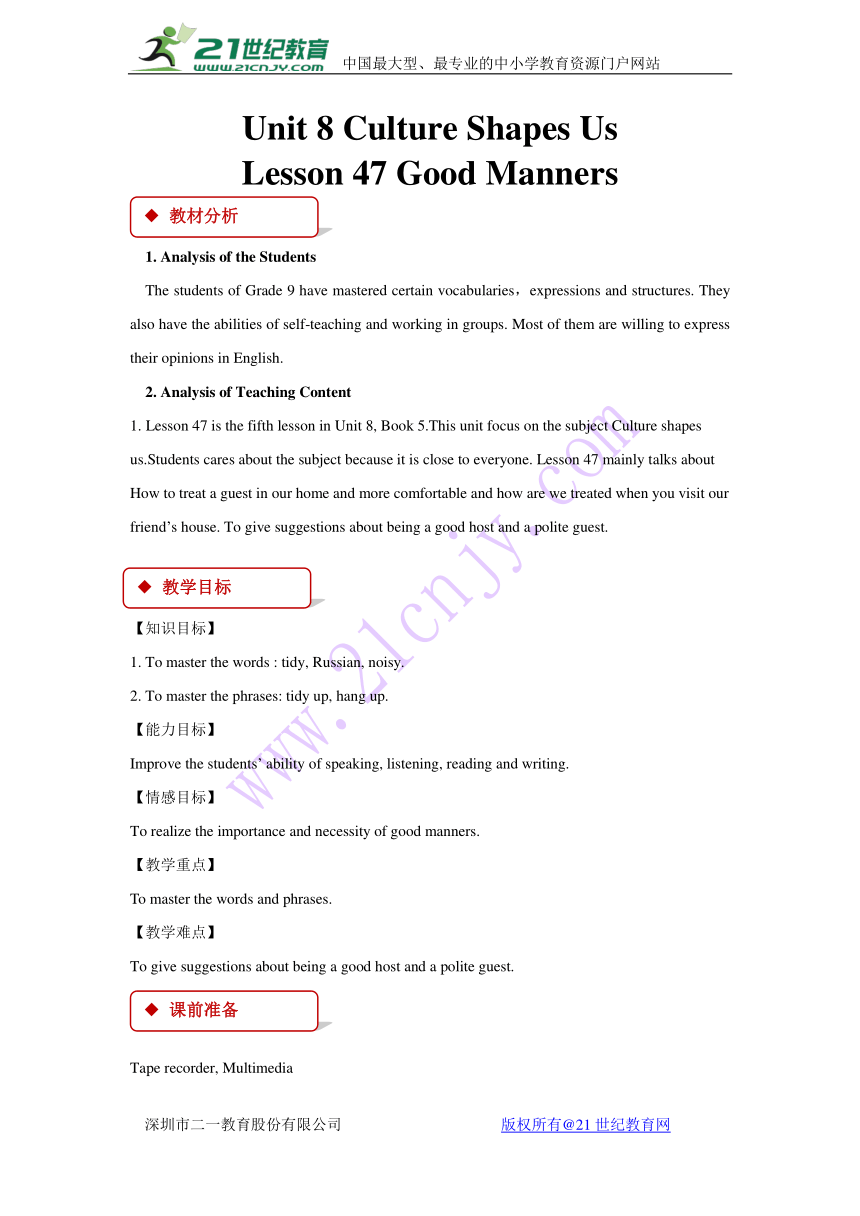
Unit 8 Culture Shapes Us Lesson 47 Good Manners 1. Analysis of the Students The students of Grade 9 have mastered certain vocabularies,expressions and structures. They also have the abilities of self-teaching and working in groups. Most of them are willing to express their opinions in English.【来源:21·世纪·教育·网】 2. Analysis of Teaching Content Lesson 47 is the fifth lesson in Unit 8, Book 5.This unit focus on the subject Culture shapes us.Students cares about the subject because it is close to everyone. Lesson 47 mainly talks about How to treat a guest in our home and more comfortable and how are we treated when you visit our friend’s house. To give suggestions about being a good host and a polite guest. 【知识目标】 1. To master the words : tidy, Russian, noisy. 2. To master the phrases: tidy up, hang up. 【能力目标】 Improve the students’ ability of speaking, listening, reading and writing. 2·1·c·n·j·y 【情感目标】 To realize the importance and necessity of good manners.【版权所有:21教育】 【教学重点】 To master the words and phrases. 【教学难点】 To give suggestions about being a good host and a polite guest. Tape recorder, Multimedia Step 1. Warm-up Show some pictures and ask students: Is it a good manners? Free talk: (1) How do you usually treat a guest in your home?21*cnjy*com How are you treated when you visit your friend’s house? Step 2. Presentation Explain the words according to the pictures. Read the lesson and fill in the table on page 122. Check the answers. Explain the language points: tide up “使整洁,使整齐”。 e.g. It is a good habit to tidy up the kitchen after cooking. 做饭后整理好厨房是好习惯。 tidy away “收拾起来”。 e.g. Tidy away the books if you don’t read books. 如果你不看书就把书收拾起来。 offer v. “(主动)给予;提供;出示”,后可以跟宾语或双宾语,能用不定式作宾语,不能用动词-ing形式作宾语。2-1-c-n-j-y e.g. My friend offered to lend me lots of money. 我的朋友欣然借给了我很多钱。 I offered my passport at the gate. 我在大门口出示了我的护照。 offer和provide offer和provide都有“提供”的意思,但有所区别。 offer通常用来表示主动提供某物,常用于 offer sb. sth. 或 offer sth. to sb. 结构中。 e.g. Can you offer me something to eat? 你能给我一些吃的吗? We should offer seats to the old man on the bus. 我们在公交车上应该给老人让座。 provide常用来表示提供需要或有用的东西,常用于provide sb. with sth.或provide sth. for sb. 结构中。 e.g. Our parents provide us with everything that we need. 我们的父母给我们所需要的一切。 The restaurant provides good service for its guests.21·cn·jy·com 这个饭店给客人提供最好的服务。 such as 与for example的区别 such as常用来列举同类人或事物中的多个例子。 e.g. I like animals, such as dogs, bears and pandas. 我喜欢动物,如狗、熊、熊猫。 for example一般只以同类人或事物中的“一个”为例。 e.g. He has ever been to many countries, for example, Australia.21*cnjy*com 他曾经去过许多国家,如澳大利亚。 remember to do sth. 意为“记着去做某事”,表示动作尚未发生。 remember doing sth.意为“记得 ... ...
~~ 您好,已阅读到文档的结尾了 ~~